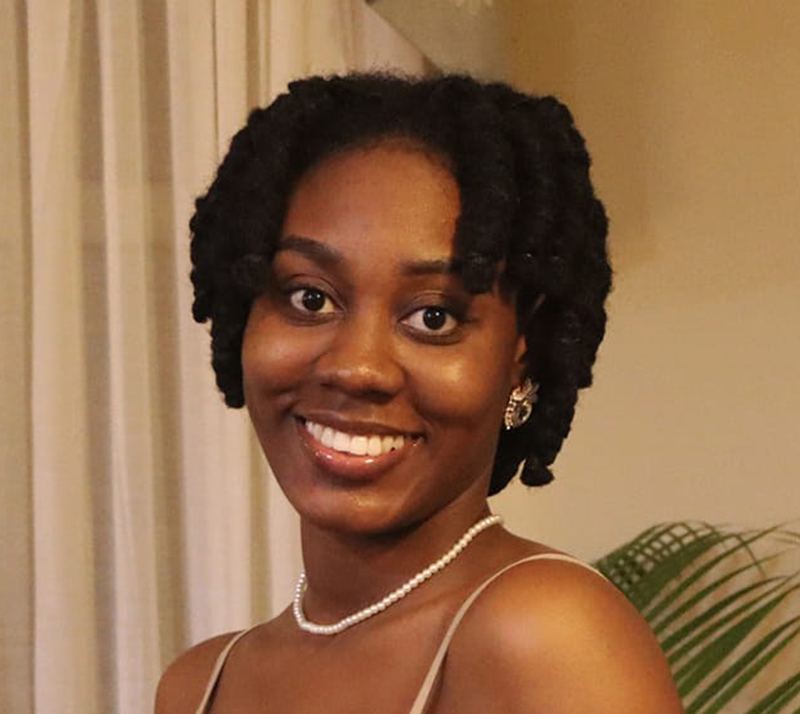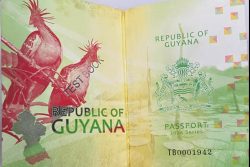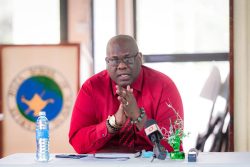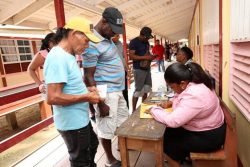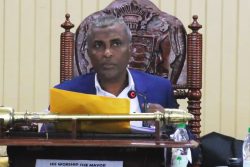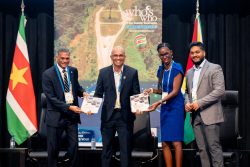 The Guyana Prize for Literature Literary Festival 2023, which was held last weekend had a number of interesting features. Apart from the Guyana Prize Awards Ceremony, which was the apex event, there was the exhibition of Guyanese Literature mounted by the University of Guyana Library and new inclusions such as the staging of the prize-winning play, Sauda, and the finals of the National Poetry Slam.
The Guyana Prize for Literature Literary Festival 2023, which was held last weekend had a number of interesting features. Apart from the Guyana Prize Awards Ceremony, which was the apex event, there was the exhibition of Guyanese Literature mounted by the University of Guyana Library and new inclusions such as the staging of the prize-winning play, Sauda, and the finals of the National Poetry Slam.
In a way, the festival has a slight extension since the play is to be staged again. The National Drama Company will hold a repeat performance of Sauda, directed by Ayanna Waddell and performed by the company, tomorrow. One of the purposes of this is to allow another opportunity for secondary school students to see it.
The National Poetry Slam, under normal circumstances, an annual national competition, was for the first time brought into this festival. Its inclusion was one of the initiatives of Minister of Culture, Youth and Sport Charles Ramson, Jnr, and proved quite a success in its new place and venue, where it was accorded recognition in the presentation of literature, while at the same time claiming proximity to Mashramani competitions in the republican celebrations.
Previously, it was held at no particular time during the year. It was inaugurated by the National School of Theatre Arts and Drama (NSTAD) in 2016 and sponsored by the Department of Culture in the Ministry of Culture Youth and Sport and the Guyana Prize. That first competition was in honour of Guyana’s Golden Jubilee – the 50th Anniversary of Independence, and the first winner was UG Law graduate, Clinton Duncan; tutor in Makeup at NSTAD, actor, playwright and spoken word poet.
The second national champion in 2017 was spoken word poet Eden – a UWI Law student whose full name is Eden Corbin. Among the runners-up were prominent performers like Mark Luke-Edwards, Keon Heywood and Carlene Gill-Kerr. The competition was not continued by the previous government and suffered an extended absence during the COVID-19 lockdown until the present government renewed it in 2023, placing it in the festival.
The new champion for 2023 is Jamicia McAlman Nelson, spoken word poet who also writes verse in the literary genres. Second place went to Jalen Chancellor, third to Kean Dey, and in fourth place was Jeremiah Bentham. It was noted that several of the 20 finalists dramatised themes of domestic violence, violence against women, suicide and positive self discovery.
The venue for the final was Castellani House on an outdoor stage, but it exhibited the same popularity and excitement as in the past when it was housed in its nightclub environment. Coordinator was Franale Holder who has also been responsible for keeping the popular performance form going before and after the national slam was introduced. It has been a fast growing attraction, especially in Holder’s series of monthly shows which featured spoken word and hip-hop.
Spoken word was well known with its own audience in Guyana before the idea of the slam was introduced in the country and the annual national competition was created. Although spoken word was well established, slamming was not known in Guyana. The performance poetry was highly influenced by hip-hop which was quite derivative and short of originality.
In 2016, the competition was launched with the specification that the entries should be composed within certain themes that celebrate Guyana as a nation, influence the audience towards self and social improvement and confront social ills. That was a condition of entry, which was quickly embraced by the participants.
The concept was that a corpus of performance poetry would be created with themes and subjects that could tackle the treatment of social ills and influence the audience for betterment. The popularity of spoken word and hip-hop was to be exploited to transmit positive messages and celebrate Guyana as a nation. The contest would be taken right into the existing popular environment and that is why it drew on Holder’s series and expertise. The competition developed under the portfolio of the NSTAD because of the school’s responsibility training, education through public events.
The other novelty was the shaping of the contest in the form of the slam, which was already established internationally. Cash prizes were offered and the event turned into an annual national event. All of these were retained with the return of the activity this year.
The idea of a poetry slam developed in the USA in the 1980s when performance poet Marc Smith sought to popularise poetry readings to make them a livelier, more entertaining activity, rather than a rather dull minority affair. Smith organised reading performances for popular audiences in unconventional venues like bars, cafes, outdoors and street corners. By 1990 the first slam competition took place in Chicago and spoken word poet Patricia Smith holds the distinction of being the first and most frequent winner (four championships).
It caught on in several American cities, but it was more practised as performances for groups of poets, and this was preferred to individual performances. Although a National Poetry Slam was created, individual competitions were discontinued and group performances became the norm.
Soon another innovator emerged in the person of Mos Def in the 1990s, and he promoted what became known as def poetry. He is famous for television promotions of spoken word and performances, especially the Def Series on HBO in 2002. There was some confusion between spoken word and def poetry.
But the slam developed quite emphatically in Canada and other countries, especially Australia and Europe. Both Australia and the Netherlands developed national poetry slams. It was the form of slam poetry practised in Holland that was actually brought to Guyana in 2016.
The word slam was likely adopted because of the high energy, fast pace and popular focus of the performance. But it is also said to have come from the fact that the audiences often judged the performances and could be very loud and damning in either their praise of good work or their slamming down of bad performances. The slam, however, referred to competitions of a particular type.
In the Dutch cities, bars and clubs are common venues for the contests in which lively audiences participate. The more formal national slams might have independent judges, but in the popular format it is the audience that is given the task of judging, or at least contributing to the judging. At least five randomly selected members of the audience (or tables) are given score cards with numbers zero to ten. After each performance they hold up a card with their scores; these are totalled for each contestant and the highest score wins. Additionally, each entry has a time limit and points are deducted for exceeding it.
As one can imagine, such an event can invoke an atmosphere charged with excitement and noise. No wonder it is called a slam. Slam poetry in such settings, has to command immediate audience appeal. Spoken word poetry in any case is written for oral presentation.
Basically, slam poetry is performed by individuals or groups without props or music or too much accessory dramatisations. But in Guyana there have been a few departures and innovations, because quite a few of the leading spoken word poets such as Luke-Edwards, Kevin Kellman, Gabrielle Mohamed and Gill-Kerr embellish their performance with dramatisations. In Trinidad, where a National Poetry Slam is also held, the strict time limits are imposed and enforced. This is not a practice in Guyana.
